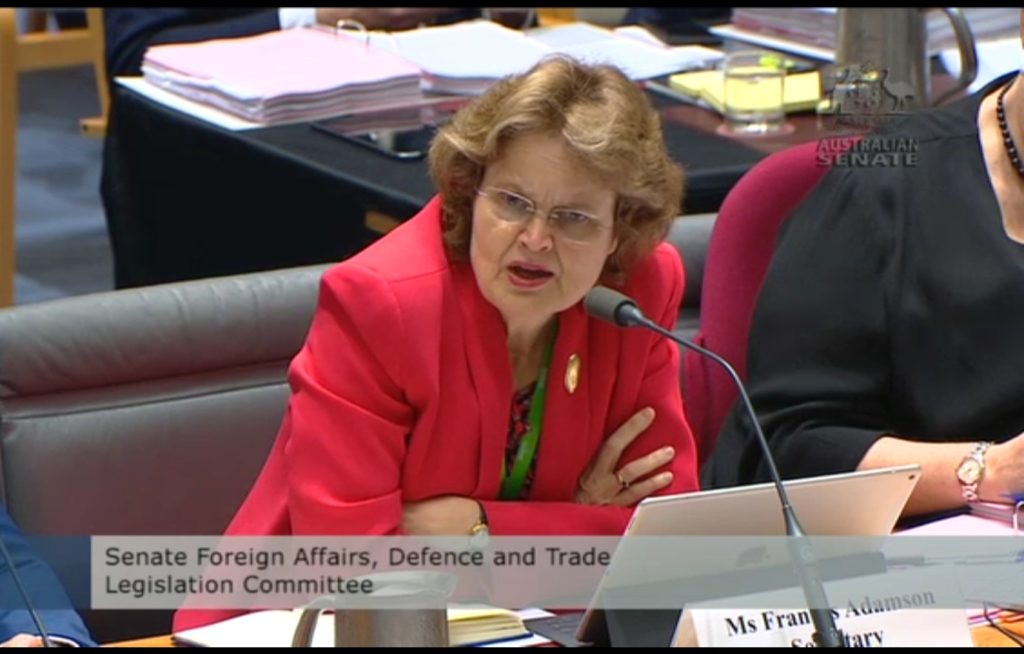FRESH AIR
Australian Government notes UNRWA concerns, but continues funding
March 6, 2020 | Naomi Levin

The Australia Government will not withhold funding to United Nations Relief and Works Agency (UNRWA), but will continue to make representations to UNRWA management to ensure funding is spent in a “targeted” way, Senate committee has heard.
During Senate Estimates hearings, Liberal Senators Eric Abetz and David Fawcett raised research that has repeatedly shown that textbooks provided by the Palestinian Authority to students at UNRWA-funded schools contain violent references, including calls to attack foreigners and make sacrifices in the name of jihad.
Frances Adamson, Secretary of Australia’s Department of Foreign Affairs and Trade (DFAT), responded to the Senators saying, “Children in those schools need textbooks on a wide range of subject matter”. “I am not trying to make the case that [the violent material] doesn’t matter, it matters deeply,” she said.
“I see exactly where you are coming from and what we need to be able to do is to deal with that element of it, without removing completely the textbooks from schools, including where they cover other matters.”
UNRWA provides services, including schools, for more than 5.5 million Palestinians living in the West Bank, East Jerusalem, Gaza, Syria, Lebanon and Jordan. It has come under fire for perpetuating the cycle of poverty of Palestinians by maintaining them as refugees over several generations, rather than helping them establish permanent roots in Palestinian Territories or neighbouring countries.
According to Australian officials, UNRWA staff have been reviewing any newly issued textbooks, developing “complementary materials to counter any bias that may exist in them” and training teachers on presenting subjects in a politically neutral manner.
But Senators Abetz and Fawcett questioned whether this goes far enough.
Senator Fawcett suggested that Australia make its $20 million a year funding to UNRWA contingent on these books being removed from UNRWA schools.
Senator Abetz agreed: “Often money speaks very loudly and if we were to say, ‘look no more funding to UNRWA until those textbooks or those elements of the textbooks are excised from the school’ wouldn’t that have some impact?”
Adamson indicated that while withdrawing Australia’s funding from UNRWA was not under active consideration, she was deeply aware of these concerns.
“We will continue to take what the Committee tells us during these hearings and use that in our representations of further evidence of the deep feeling in Australia about this issue,” she told the Senators.
On a separate, but related, matter, senators also learned that DFAT has received a copy of the as-yet unpublished report into top-level mismanagement at UNRWA and had been assured by new Commissioner General Christian Saunders that reforms were being implemented.
According to DFAT officials, the findings went to “management deficiencies and misconduct, rather than fraud or diversion of funds”, but no Australian money was misused.
UNRWA managers were accused of bullying, nepotism and excessive and unnecessary travel. The former UNRWA commissioner general, Pierre Krahenbuhl, resigned in the wake of accusations.
Saunders told Australian representatives that, since Krahenbuhl’s departure,“governance, management and accountability mechanisms are being improved”. He will be introducing an ombudsman function, strengthening the Department of Internal Oversight Services, shifting to needs-based budgeting rather than what had been the income-based approach, and reviewing the organisational structures, as well as the recruitment systems of UNRWA.
RELATED ARTICLES

US Middle East strategy amid regional instability: Dana Stroul at the Sydney Institute






















